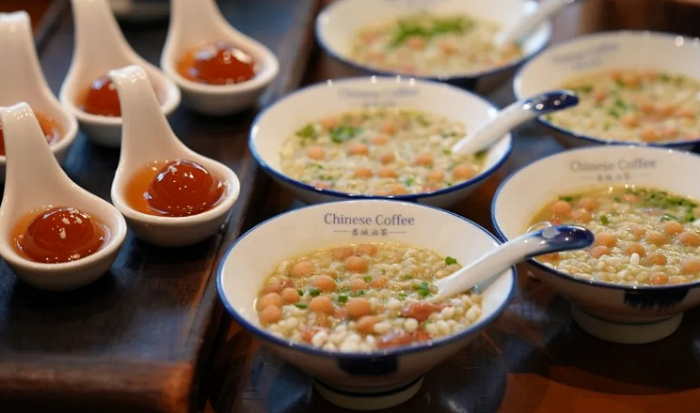Gongcheng Oil Tea
In the early morning, as you walk through the streets and alleys of Gongcheng Yao autonomous county, the rhythmic sound of making oil tea echoes from the residential buildings.
Pounding is the essence of oil tea. In a small iron pot, oil is heated before adding tea leaves, ginger, peanuts, garlic, and other ingredients for a quick stir-fry. Then, with a tea pestle, the mixture is pounded repeatedly in a "7" shape.
When the ingredients take on a slightly golden brown hue, hot water is poured in and allowed to boil. The tea residue is then filtered out with a tea strainer, leaving behind a steaming pot of oil tea. Served alongside rice flowers, crispy nuts, and aiye rice cakes as snacks, the tea boasts a unique flavor.
Upon tasting, it offers a slightly astringent with a hint of sweetness. The piping hot tea dances on the taste buds, the bittersweet aftertaste tingling the palate, often causing a thin sheen of sweat on the forehead and back- a common sensation for first-time drinkers of the oil tea.
Gongcheng oil tea traces its origins to the Tang Dynasty (618-907). In the past, the southern mountainous regions were often plagued by miasma, and oil tea was cherished for its refreshing, digestive, stomach-strengthening, and dampness-expelling properties, leading to its widespread consumption among the Yao people.
In Gongcheng, oil tea is not only a part of the daily staple during meals but also a unique cultural expression of the Yao ethnic group. Over its millennium-long history, Gongcheng oil tea has evolved into a cultural ritual, complete with specific customs and etiquette.
The Yao oil tea customs have gradually become an important means of socializing among Yao compatriots, a significant aspect of ceremonies, and the highest form of etiquette for entertaining esteemed guests.
In 2021, the "Yao Oil Tea Customs" of Gongcheng were recognized as part of the fifth batch of national-level intangible cultural heritage representative projects. In 2022, "Yao Oil Tea Customs" was included in the UNESCO Representative List of the Intangible Cultural Heritage of Humanity. By the end of 2023, Gongcheng oil tea had earned a place in the first batch of the "Guilin Classic" list.

Gongcheng oil tea is also known as "Chinese Coffee". [Photo/WeChat account: HiGUILIN]


